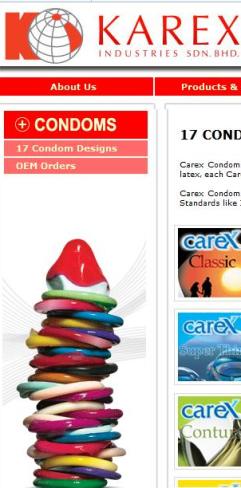August 13, 2012, - 3:01 pm
Muslims Are World’s Biggest Condom Makers, Biggest Customer is US Govt; Condom IPO, Condom Consultant
Remember when faux-conservative Boston Globe columnist Jeff Jacoby railed against sexually-enhanced interrogation techniques on Islamic terrorists at Guantanamo Bay, lecturing us on “Islamic modesty,” which he insisted was superior to modesty in Christianity and Judaism, not to mention the security of American lives? Well, now, we have yet another example of this “Islamic modesty.” The Muslim country of Malaysia is the world’s largest condom producing country and is also home to the biggest condom manufacturer. The company, Karex Industries, stands to make a lot of cash in an upcoming condom IPO. The company makes condoms, lubricants, and “probe covers.” Karex’s website lets you know it makes condoms “to complete your demands: fruity, spicy, aloe vera, sweet, cool, contoured, assorted colour, assorted flavour, baggy, super thin, strawberry, duo colour, X large, slim fit, 3 in 1, power shot, dotted, and rough & tough.” The thing is, you are the company’s biggest customer . . . by force. The USAID is Karex’s biggest condom buyer after Congress said condoms bought by U.S. agencies no longer had to be made in the U.S. And USAID buys in bulk from Karex to give these condoms out in the Middle East and Africa. Yup, we’re getting screwed by them so they can screw each other. And, yes, this is Malaysia, the same country that gave a hard time (no pun intended) to Lady Gaga and Beyonce because they wanted to have concerts there but weren’t “modest” enough. But, hey, selling condoms to infidels and making bank on that–that’s “modest.” (Malaysia’s also the country whose leader openly called for the mass murder of Jews and said he supported homicide bombers.)


File under: Islamic Modesty #788,137 (and How To Tell Mom When You Become a “Condom Consultant”):
Investors are ever on the lookout for the makers of products that keep selling well in a recession, like food, toothpaste or pharmaceuticals. Here’s another possibility: condoms.
That’s what Malaysian condom manufacturer Karex Industries Sdn. Bhd. is hoping, at least. The biggest condom manufacturer in a country that makes more condoms than any other, Karex has disclosed plans in recent weeks for an initial public offering and to double capacity over the next several years.
Investors are especially keen to invest in Malaysia, after the country defied a weak global IPO market to conduct the world’s second- and third-largest offerings this year. . . . .
In some ways, Karex’s expansion plans run counter to industry trends, with rivals forecasting slower growth than Karex does, says Bill Howe, the president of Ohio-based latex company PolyTech Synergies LLC and a consultant to the condom industry for 25 years.
Can you imagine the conversation with that guy at a party? “And what do you do for a living, Bill?” “Me? Oh, I’m a consultant to the condom industry.” I think I’ll use that line the next time I’m sitting next to someone on a plane who won’t shut up. And there’s always, “Mom, I know you wanted me to be a doctor. But I aim high. I’m a condom industry consultant!” “And how exactly, Billy, do you condom consult?”
“I’m surprised at [Karex’s] ambitious plans.…I don’t see other firms making a similar kind of expansion,” he says.
Global condom consumption is set to grow between 5% and 8% annually, driven mainly by China, Mr. Howe says. Market-research firm Global Industry Analysts forecasts that the world-wide market will reach 27 billion condoms valued at $6 billion by 2015, from 20 billion units at $4.2 billion this year.
Karex’s main customer base includes countries like United Arab Emirates and Morocco. But also the U.S., through your tax money.
The Malaysian company, which markets condoms under the brand name Carex and makes condoms for other companies under contract, wants to double its capacity to six billion pieces, equivalent to 30% of the current global condom market. Karex, which has budgeted 70 million ringgit to 80 million ringgit, or roughly $20 million to $25 million, for the expansion, said revenue increased 15% last year. Exact figures weren’t available.
Other players in the industry include Reckitt Benckiser PLC of England, whose Durex condoms currently claim more than 30% of the global branded market, and New Jersey’s Church & Dwight Co., which sells Trojan condoms as well as other products, such as Arm & Hammer cleaners. Reckitt Benckiser and Church & Dwight didn’t respond to requests for comment.
The condom market is recession-proof and growing, says Karex Executive Director Goh Miah Kiat. The company plans to file IPO documents with Malaysia’s Securities Commission by year-end for a listing next year. Mr. Goh declines to say how much the company would seek to raise.
Production from rubber plants in Malaysia increased in the early 20th century when the commodity became commercially attractive as a raw material for American tires. After decades of shipping raw rubber, the country moved toward downstream processing in the early 1990s as a means to boost exports.
Mr. Goh’s family started planting rubber trees in the southern Malaysian state of Johor in the 1960s and eventually expanded to processing. The family switched its focus to condom manufacturing with the founding of Karex in 1988. . . .
The company scrutinizes all of its prophylactics for pinholes before they make their way to markets from China to the Middle East to Latin America, as well as to government agencies that distribute condoms free in places like Africa. At a facility in the southern Malaysian state of Johor—Karex has three plants in Malaysia and Thailand—a worker examines and stretches some 14,000 pieces of contraceptive sheath a day, Mr. Goh says. . . .
Karex’s condom exports surged over the past decade in response to the HIV/AIDS epidemic. But sales rose especially sharply in 2009 after the U.S. Congress no longer required that government agencies buy U.S.-made condoms exclusively.
Today, roughly half of Karex’s sales are to government agencies. The USAID alone budgeted more than $80 million to purchase condoms in 2009 to distribute free in developing countries, according to a July 2011 report from the agency.
Mr. Goh says the average government tender requires 100 million to 150 million condoms, more than many companies’ annual production. “We have the capacity that…competitors lack,” he says.
Karex intends to automate its condom-inspection procedure as the company expands capacity. Automated inspection “is the way forward to become more cost-effective and reduce margin for errors,” Mr. Goh says.
I already learned everything I need to know about Islamic modesty from Mohammed Atta and the Pink Pony strip club, not to mention the many strip clubs Muslims own all over Detroit.
Now, I learned more from Condom Kingdom a/k/a Malaysia.
Tags: Arm & Hammer, Bill Howe, Carex Condoms, Church & Dwight Co., condom consultant, condom IPO, condoms, consultant to the condom industry, Durex condoms, Global Industry Analysts, Goh Miah Kiat, Islam, islamic "modesty", Johor, Karex Condoms, Karex Industries, Karex Industries Sdn. Bhd., Malaysia, Muslim Modesty, PolyTech Synergies LLC, Reckitt Benckiser PLC, Trojan condoms, USAID


Debbie, I recently read that a Muslim terrorist Iman said it was ok for the terrorist to have anal sex with their fellow terrorists who where picked to carry explosives in their rectum. supposed to aid them in widening the passage. Malaysia is trying to corner a market share.
Bobby99 on August 13, 2012 at 3:16 pm